Disclosure: Meeple Mountain received a free copy of this product in exchange for an honest, unbiased review. This review is not intended to be an endorsement.
Full disclosure: I don’t like word games.
For years, whenever I have been offered the chance to play Scrabble, I can feel the sense of dread creeping over me in the same way I feel when I stare at the New York Times crossword puzzle on a Sunday morning. Pull random words out of thin air? Nah, I’m good.
I own a copy of Scrabble. My wife added it to our board game collection when we moved in together. I don’t think I’ve played her copy, which means I haven’t played Scrabble in at least 15 years.
Bananagrams? Another one added by my wife. It’s still sitting in its cute, yellow, banana-shaped cloth bag on one of our shelves in the basement. I’m not even sure I remember how to play it, but I remember liking it for its small table footprint.
So I completely understand that your collective jaws will drop when I tell you to buy a word game called Illiterati, from publisher Gap Closer Games. Illiterati throws a fresh coat of paint on that decrepit concept known as word games: finally, a word game that’s fast, fun, brainy, and cooperative.
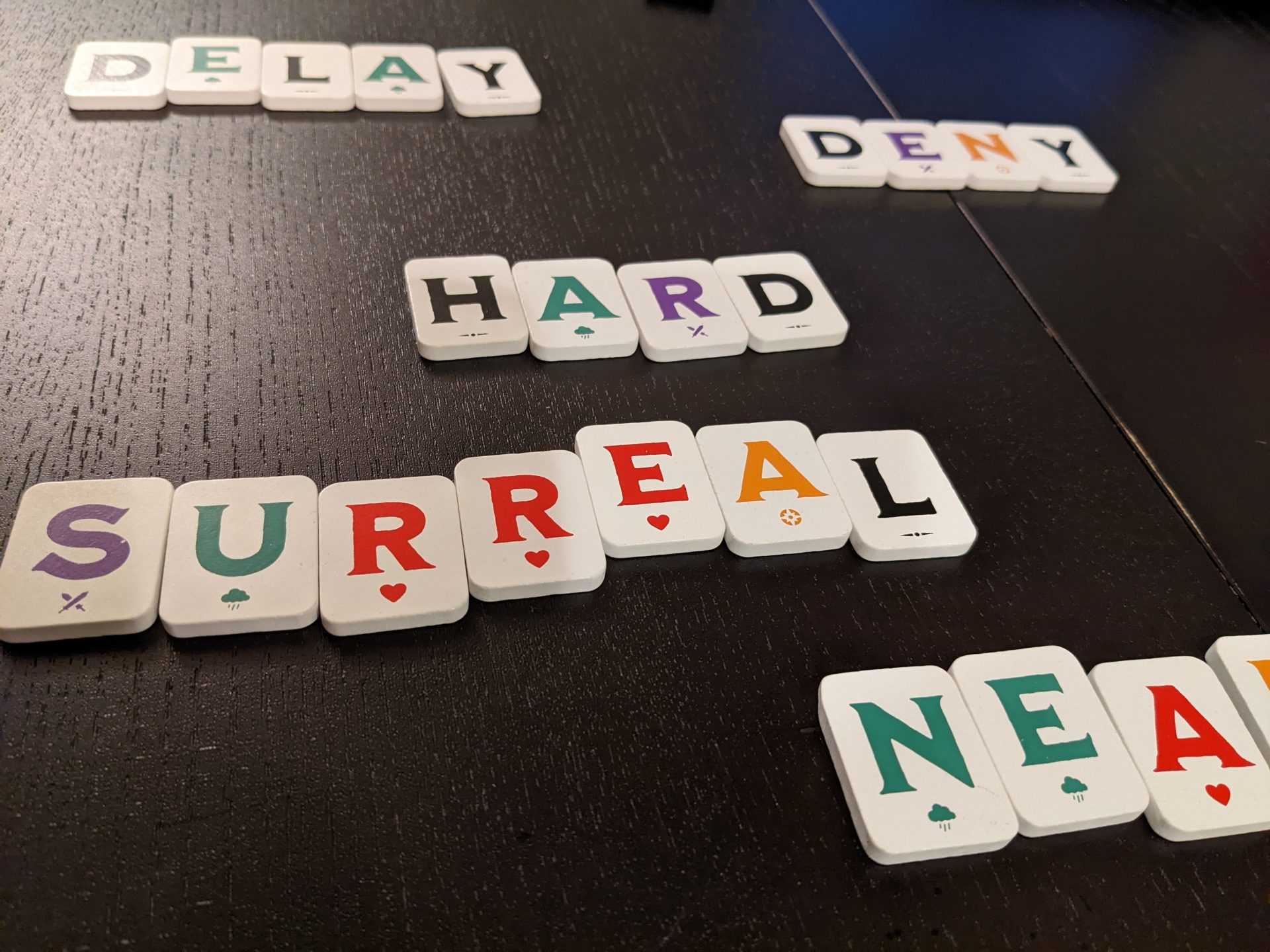
Getting It to the Table is a Cinch
I first watched a partial playthrough of Illiterati at GAMA Expo a few weeks ago, and just standing around for about 10 minutes, I saw most of a full game. That told me Illiterati will always be really easy to get to the table because it is so easy to teach and super quick to play.
As a member of the League of Librarians (I’m not kidding), your goal is simple: fight illiteracy with your fellow Librarians by binding books and surviving the onslaught of the Illiterati. Bind at least 2 books per player and bind one final chapter as a group before the team has burned too many letters, and the group will win!
The easiest way I can think of to describe Illiterati: it’s a speed game of Scrabble, with more letter tiles and cooperative play (mostly, which I’ll get to later).
Players are given 7 letter tiles from a draw bag every round. Then a 3-minute sand hourglass is flipped and everyone works together to build words from the shared pool of letters on the table.
Players spend the first couple of rounds building words into books (“binding”), based on a Book card dealt at the start of the round. Each book has a goal, usually based around words that align with something random: shapes and math terms, retail brands, modes of transportation. Use 8 or more letters mixed with symbols which appear on the bottom of some letter tiles, and you will be able to bind that book.
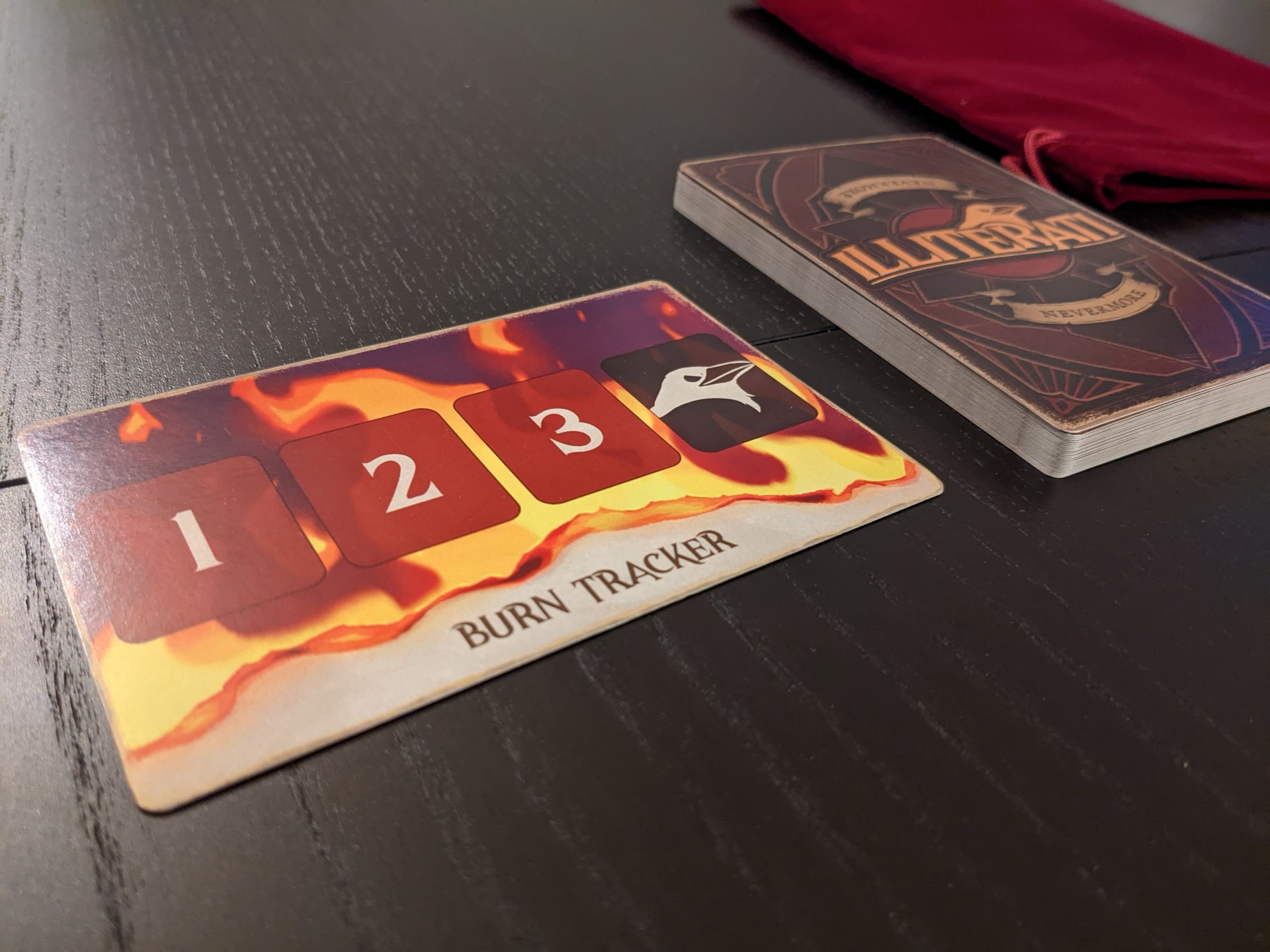
Once a player reaches their own personal bound book goals, they move from red cards (easier) to blue Book cards. Binding blue books gets a little more challenging, like building complete sentences, alliterations, antonyms, anagrams. (Don’t worry: if you don’t remember what any of these terms mean, helpful examples and definitions are provided on each card.)
While all of this is happening, chaos ensues. Asking other players for a specific letter from their pool—while yelling, obviously—is common. Even when a player has completed their personal goal, they will still be a part of the conversation, as the game can only move to the finale once everyone has completed their personal goal cards.
Additional chaos? The Illiterati characters, in the form of cards, with names like Bastille Malvado and Professor Absalom Faust. After the timer is up and players have validated the words played in a round, a random Illiterati card is dealt, which usually penalizes players by making them remove a few letters from the table, forcing everyone to work together again to make sure everything left over is actually a word.
When all players have achieved their personal goals (2 books on Normal, more for Hard and Legendary difficulties), the final round is triggered. The challenge is epic: using a lot of letters and the collective brains around the table, each player must individually spell out a lot of words with not nearly enough letters, all on the same turn.
Throughout the game, players will “burn” letters to a card each time the team fails an objective. Burn too many, and you’ll lose even before getting to the finale. I’ve rarely seen a team lose, but scale up the difficulty and things can get interesting!
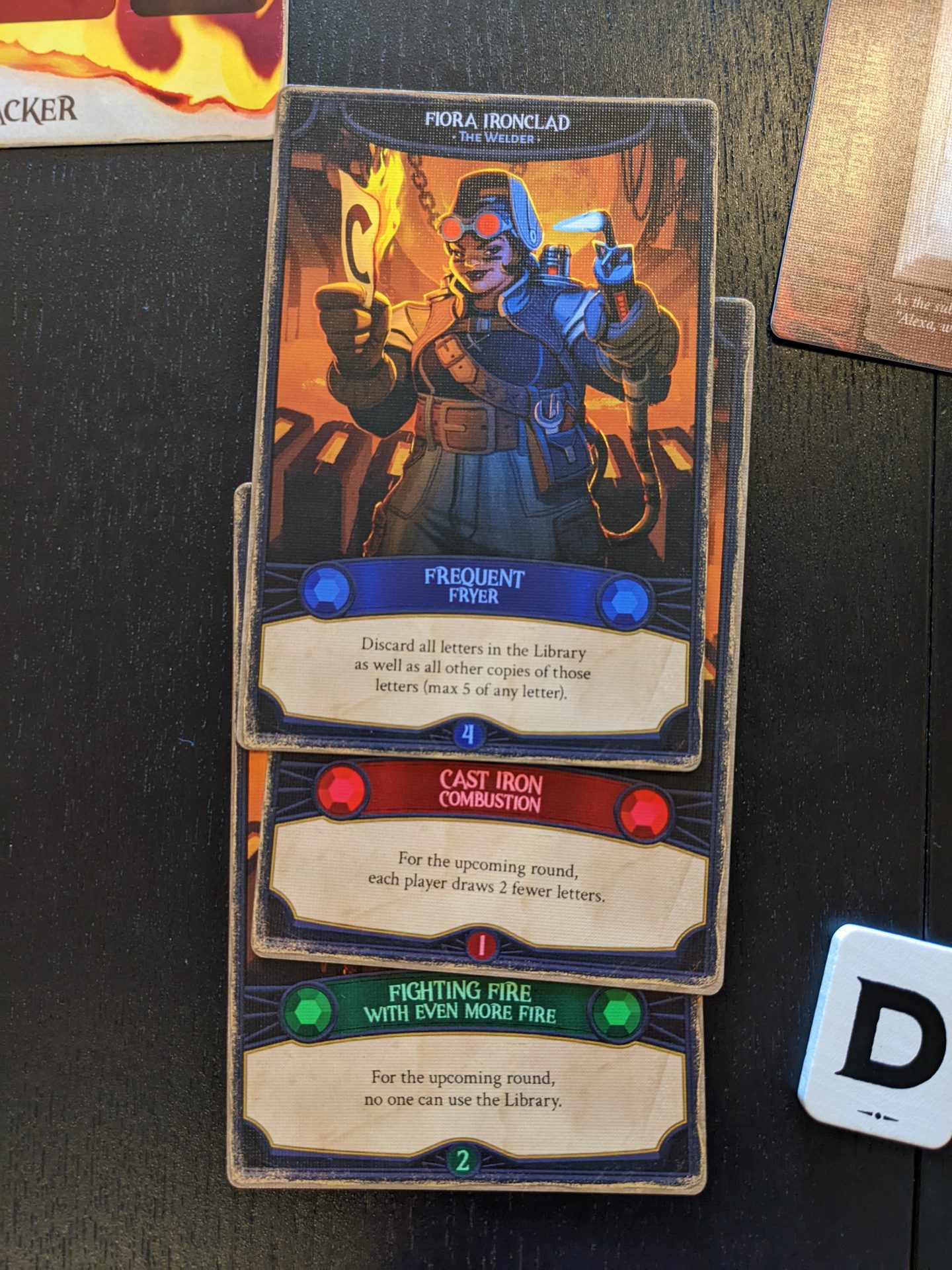
Player Count is Key
To learn the game, I gave Illiterati a spin at solo. I have to say, solo is a miss.
This is not because the game isn’t exactly what it says it will be. Illiterati is just so much different when players are working together, scrambling, to use their collective word spirit to get everyone the letters they need to build words and bind books before the timer runs out.
When you are playing alone, you really are on an island. There’s no chaos, and chaos is the main reason for playing. Even at 2 players, I would still not recommend this game.
Illiterati also features team vs. team play, a mode I didn’t try for this review. But if you are in the mood for something akin to a word battle, or just a competitive format, Illiterati has you covered.
I did play this with my 8-year-old daughter using the “Junior Mode”, which takes away the 3-minute timer and the requirement to complete a Final Chapter challenge at the end. It’s fun, and it’s even shorter than the already-brief base game.
The Junior Mode offers more chances to game with my wife and daughter while teaching her something beyond more simplified gaming experiences. Now that my daughter is a full-blown reader—she put away Harry Potter and the Goblet of Fire in just a couple of days—it’s been exciting to watch her flex the brain a bit by thinking of fast food chains or countries that use at least 8 letters, like some of the Book cards do in Illiterati.
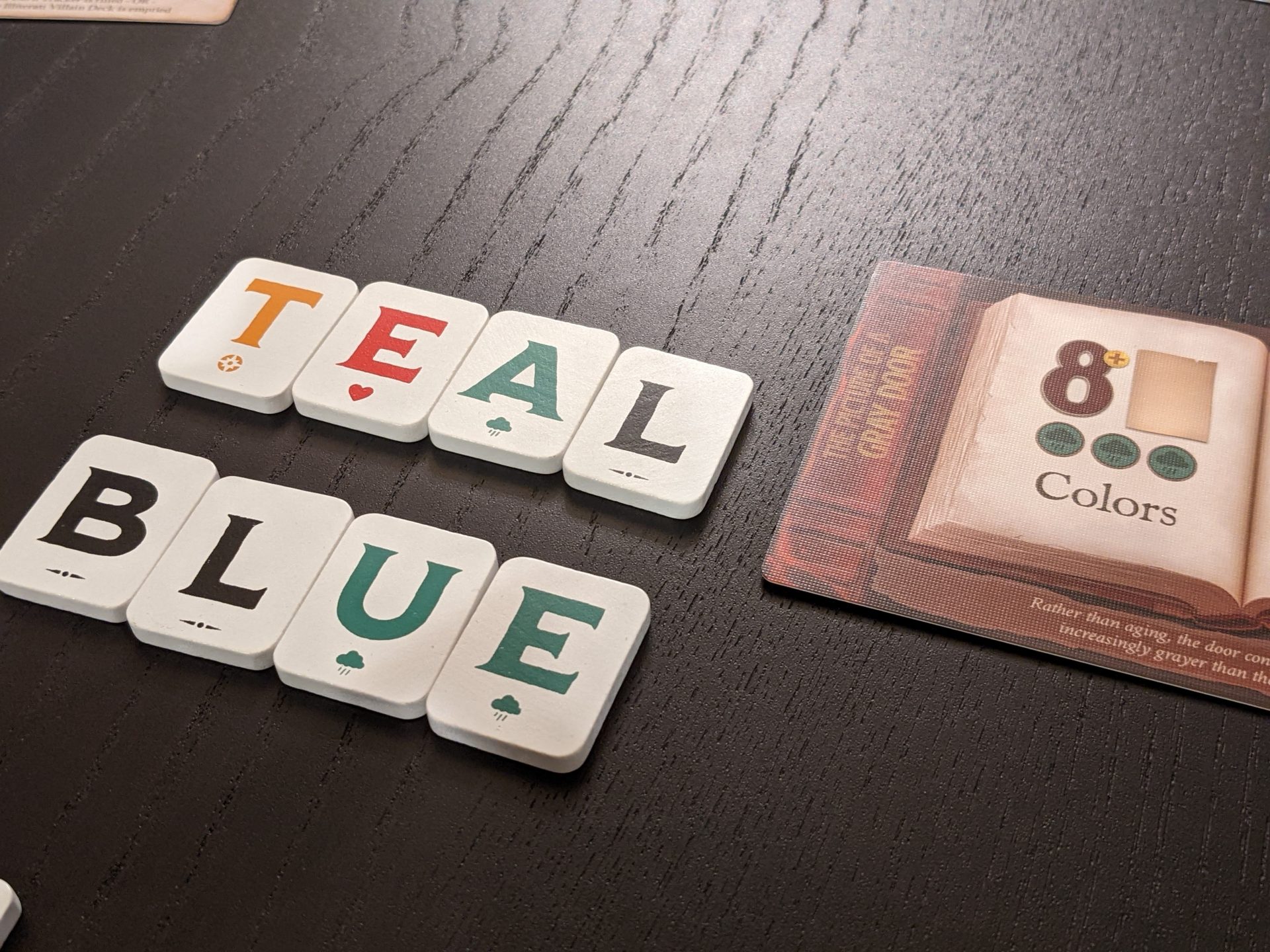
Tasty Light Fare
Illiterati is perfect for co-op groups looking for a way to scratch the Scrabble itch in 20 minutes.
One of the biggest hurdles to accessibility in word games: creativity. How many times have you played Scrabble and found yourself staring at 5 or 6 letters, without a clue in the world of what word to build? Illiterati takes that issue off the table by pushing players to work together, with a shared pool of letters and a somewhat tight timeframe to solve a puzzle.
Crossword puzzle expert? Buy Illiterati. Looking for a way to freshen up that dusty old copy of Bananagrams? Buy Illiterati. Looking for a creative gift for people new to the hobby? Buy Illiterati.
I can’t comment on the final production of Illiterati because I was given a copy in a Ziploc bag. That said, the game travels very well, and the tiles reminded me of my copy of Rummikub with their lighter weight and bright iconography. As always, I wish the tarot-sized cards had matching larger text, but that’s a nitpick from a guy who is struggling more and more each day with his eyesight.
Illiterati is a fun time. Even if you are not a lover of word games, give this one a look!


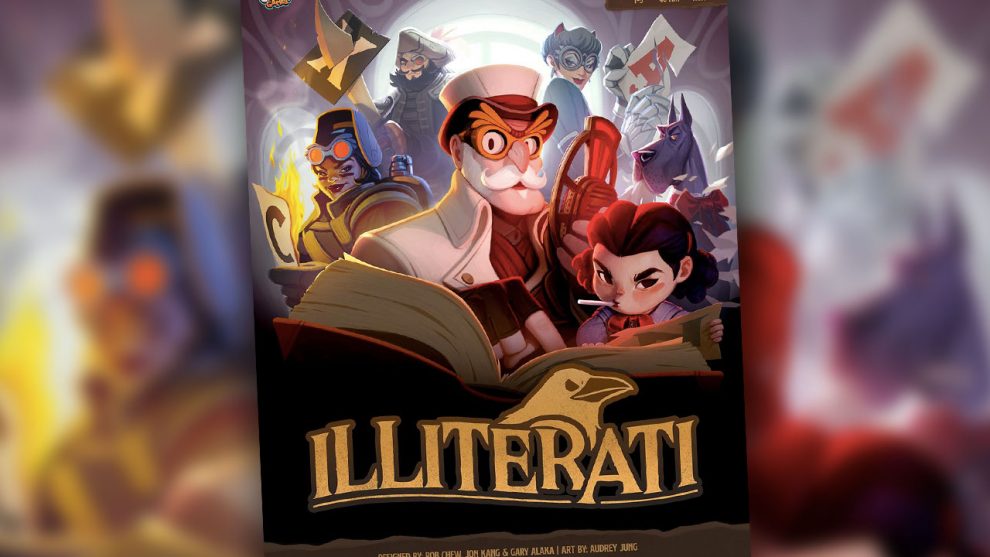

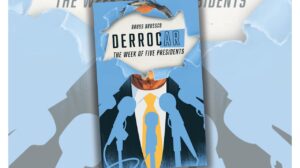

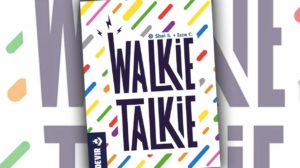
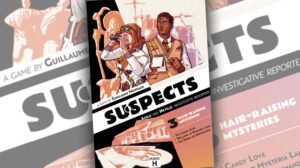




Add Comment